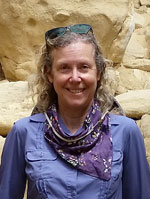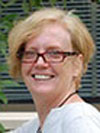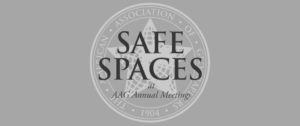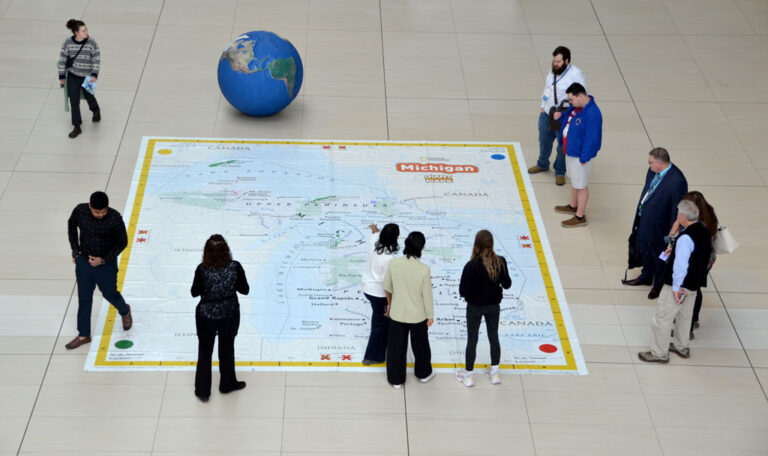Harassment-Free AAG: What to expect at the Washington D.C. Meeting


I am excited to write that there are four weeks to go in our countdown to the AAG Annual Meetings in Washington DC (April 3-7, 2019). I welcome guest columnist Dr. Lorraine Dowler, who has been a prior contributor to this space, and this month we highlight Climate Change to which we can all contribute positively for the AAG Meetings.
Harassing behavior by powerful individuals towards those more vulnerable has given rise to recent social movements including #MeToo, #UsToo and, Idle No More to name a few. These social movements are also influencing the academy as countless numbers of academic associations are currently examining how safe and inclusive their academic meetings are for those members who do not represent the majority of meeting attendees. These associations are gathering data about harassment through surveys, updating professional codes of conduct and hiring consultants to develop programs that directly address harassment and the creation of safe and inclusive spaces at academic meetings. Relatedly, the AAG charged a task force in Spring 2018 to gather information and recommend programmatic changes in order to envision a safer and more inclusive national meeting. The Council approved the task’s force proposal for the 2019 meeting, and this column will furnish a preliminary overview of resources that will be available to attendees at the Washington meeting.

The Harassment-Free AAG task force is committed to addressing sexual harassment in the Academy and at the national meeting. However, sexual harassment is only one form of harassment experienced at national meetings, and the task force is wary of addressing sexual harassment only, as that singular focus will allow for other forms of harassment, such as racism, transphobia and religious intolerance, to name just a few, to remain in the shadows. Therefore, the goal of this proposed program is to work towards a Harassment-Free AAG so that all of our members can benefit equally from attending the national meeting. This approach places the AAG as an institutional leader in addressing diverging and intersectional forms of potential harassment at a national meeting.
The task force took its lead from NSF’s ADVANCE Program Guidelines for the development of anti-harassment programs in academic societies and meetings. According to these guidelines, every anti-harassment program should adopt, at least, four fundamental elements. These elements are widely recognized as a “Standard of Care” for harassment prevention and remediation. They are:
- A worded, widely disseminated, written anti-harassment policy;
- Accessible and flexible complaint procedures designed to encourage people to come forward;
- Prompt, thorough, and impartial investigative procedures implemented by appropriately trained investigators; and
- Prompt and appropriate follow-up actions designed to stop harassment, discipline offenders, and protect complainants from any adverse effects of reporting
Keeping these guidelines in mind, we are implementing the following Harassment-Free AAG program at this year’s meeting. We are at the start of this process, and we encourage ideas and interventions from the membership on how to achieve an Harassment-Free AAG. You can find updated information about the program at http://annualmeeting.aag.org/conduct
At the registration desk at the D.C. meeting, you will receive information and links to our new Harassment-Free AAG policy and our newly expanded Statement of Professional Ethics. These statements reinforce that professional ideas and information are exchanged most effectively at the AAG meeting in an atmosphere free of discrimination or harassment and characterized by courtesy and respect. The AAG prohibits any form of harassment, sexual or in other forms, as outlined in these statements. We ask that you familiarize yourself with these statements as any violation of the Harassment-Free AAG policy will be reviewed by the Standing Committee on AAG Annual Meeting Attendee Disciplinary Matters and if warranted disciplinary action will be taken.
Resources for Attendees
On-Site Independent and Confidential AAG Advocate
Advocates are professionals trained to provide confidential support victims of crime as they offer individuals information, emotional support, and help in finding resources and filling out paperwork, such as filing a complaint with an ombudsperson.
The AAG Advocate is a licensed social worker, and all interactions with the advocate will remain confidential. The advocate will be available to meet with conference attendees if:
- An attendee feels they were harassed or assaulted at the meeting and needs emotional support and/or access to victim services as well as reporting information.
- An attendee who has been harassed or assaulted at their home university and needs help in understanding what resources are available to them at their home institution.
- An attendee who is interested in creating or strengthening policies at their home institutions. The advocate is well-versed in Title IX accommodations and will have some sample policies on-hand for informational purposes.
<!–Contact information, bio and advocacy philosophy statement for the advocate can be found at http://annualmeeting.aag.org/conduct.–>
Workshop: Coordinated Department Response to Online Harassment
A 90-minute workshop will address how as technology improves our access towards instant communication with colleagues and rapid information sharing increases, we have also seen an increase in the use of technology to perpetuate harassment and harm. The workshop leaders Dana Cuomo and Natalie Dolci are members of the Seattle-based Technology-Enabled Coercive Control Working Group. Their research focuses on the role of technology in domestic violence, sexual assault, stalking, and harassment situations and how systems can better respond. In this workshop, attendees will learn how your department can better assist faculty, students and staff who are experiencing online harassment. Whether a department member is being targeted by a former intimate partner or someone who is ideologically opposed to their scholarship, workplaces have a responsibility to respond to the best of their ability. This workshop will give scenario-based practical tips for protecting your online privacy and best practice workplace policies to engage your institution in supporting its employees.
Look for further information about the workshop soon.
Off-Site Independent Ombudsperson
An independent ombudsperson will serve as the first point of contact for someone wanting to file a harassment complaint. The ombudsperson will work with AAG staff and the Standing Committee for handling incident reports. The ombudsperson will interact with complainants and alleged harassers and investigate the alleged incident. The ombudsperson will then supply the Standing Committee with incident reports.
Support A Harassment-Free AAG
Linked Sessions
The Harassment-Free AAG task force is sponsoring 27 sessions that make interventions into The Academy around issues of identity. The panel Enough! leads off the linked sessions on 3 April 2019, followed by other sessions and panels, including Sexual Harassment and Bullying Policies in Academia on 4 April. Other sponsored panels may be found on the AAG Session Gallery by searching for “Harassment-Free AAG Initiative” sponsorship. The task force wants to acknowledge the important and critical work that the organizers of these sessions are doing in making interventions into the academy around issues of mental health, all forms of harassment, physical health, and or identity in the discipline. The task force hopes this linking will promote attendance and will also serve as a powerful act of solidarity for a Harassment-Free AAG.
New Photography Policy
In parallel with photography policies at other professional meetings, AAG will provide information cards for presentations, to enable and support presenters who do not wish to have photos taken of themselves or their presentations without their permission. While some may consider photography a professional compliment, others have been harassed by photographers. In addition, some presenters may wish not to have their photos or embargoed research posted on social media or geotagged.
Please note that official AAG photographers and videographers are authorized to take photos and videos of all AAG-sponsored or AAG-organized events. However, the official AAG photographers and videographers are instructed to respect individual presenters’ preferences regarding permission to record them or their presentations.
Harassment-Free AAG survey
Attendees from the Washington D.C. meeting and past meetings will receive an email link to the Harassment-Free AAG survey. The survey will open shortly after the close of the D.C. meeting. The survey addresses multiple forms of harassment, including harassment based on disability, gender identity and/or gender expression, cultural expression, sexuality, racial identity, ethnic identity, and sexual harassment. This survey asks about the harassment you have witnessed or heard about, as well as harassment that you have directly experienced. Even if you do not believe that you have witnessed or experienced harassment, your responses are valuable, and you are encouraged to take this survey. The survey will be conducted by a research consultant who is independent of the AAG, and all responses will be confidential.
Visibly Support Your Colleagues for a Harassment-Free AAG
There will be Harassment-Free AAG lapel buttons available at different locations at the conference, including the registration and information desks. We ask that you wear these buttons as a statement of solidarity and a personal statement that as a meeting attendee will not tolerate any form of harassment at the national meeting. Information fliers will also be distributed with AAG Meeting materials.
We Need Your Patience!
Harassment at academic meetings will not be eradicated overnight. Academic meetings have a long history of complex social interactions where the vulnerability of junior scholars increases when they are put in close contact with influential scholars in an atmosphere that blurs the lines between work and play. It would be uncaring to those who have experienced harassment at the hands of influential actors to assume that this new program will mitigate their sense of precarity at the national meeting. Still, the fastest growing sector of our membership is students, and the task force feels immediate and innovative action is required to protect a new generation of scholars. For this reason, the task force intends to go beyond the simple updating of policies around sexual harassment only. Although this is a critical step for any academic association, as stated earlier the task force is committed to engaging with multiple forms of harassment directly at the meeting. As a result, we may be the first academic organization to host an independent on-site advocate, as well as an independent ombudsperson to engage with care any attendees who feel they are the victim of harassment. It is also important to mention that the Harassment-Free AAG task are your colleagues and are volunteers. They worked on this program in the evenings, over the weekends and traveled to multiple locations for work sessions and the AAG is most grateful for their important work. We also want to acknowledge that this program has increased the already high workload of the AAG staff, and we are appreciative of their labor and insight in implementing the program. For these reasons, we ask for your patience over the next month as we continually update the forthcoming Harassment-Free AAG site, as the program will be a work in progress until the first day of the meeting.
Meet the Harassment-Free AAG Task Force:
- Dana Cuomo, University of Western Kentucky
- Debanuj Dasgupta, University of Connecticut
- Dydia DeLyser, California State University, Fullerton
- Lorraine Dowler, Penn State University
- Latoya E. Eaves, Middle Tennessee State University
- Candida Mannozzi, American Association of Geographers
- Carrie Mott, University of Louisville,
- Beverley Mullings, Queens University
- Marianna Pavlovskaya, Hunter College and Graduate Center – CUNY
- Erin Royals, Rutgers University
- Rashad Shabazz, Arizona State University
- Erica Smithwick, Penn State University
- Deborah Thomas, University of North Carolina, Charlotte
- Rebecca M Torres, University of Texas, Austin
Closing Comments
As President I am grateful to the Task Force’s efforts, led by Dr. Lorraine Dowler. I ask that we all recognize Dr. Dowler’s vision and again the efforts of the AAG Staff and AAG Directors, the AAG Council, the Executive Committee, and Past Presidents on whose shoulders we stand, and you, our Members, in supporting and launching this new policy for a more welcoming and safe space for our AAG Annual Meetings. Thank you everyone for your contributions to usher in this new era for the AAG. Together, we are making a difference now and for the future. Please share your thoughts with us and your AAG Councilors and other leaders who work hard on behalf our members. We look forward to seeing you all in Washington DC next month!
— Dr. Sheryl Luzzadder-Beach, AAG President
University of Texas at Austin
Email: slbeach [at] austin [dot] utexas [dot] edu
— Dr. Lorraine Dowler, AAG National Councilor
Pennsylvania State University
Email: lxd17 [at] psu [dot] edu
DOI: 10.14433/2017.0052
Please share your ideas with me at: slbeach(at)austin(dot)utexas(dot)edu
To register for the annual meeting, click here.

